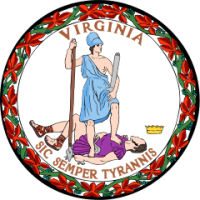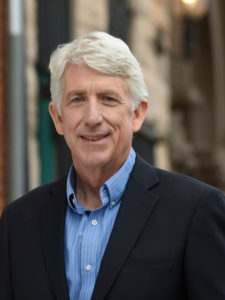
In the race to serve as the Attorney General of the Commonwealth of Virginia, incumbent Attorney General Mark Herring (D-VA) faces-off against lawyer John Adams (R).
The attorney general has a constitutional responsibility to provide legal advice to the state government, including the governor and the General Assembly, to defend the state in lawsuits, and to defend the constitutionality of state laws. The attorney general is also second in the line of gubernatorial succession, following the lieutenant governor.
Traditionally, the attorney general’s office is used as a political stepping-stone for higher office and campaigns for the office often become inappropriately politicized. In considering the Off on a Tangent endorsement, I only consider issues that are germane to the role of the attorney general—mainly legal competence.
Virginia attorney generals must be at least thirty years old, citizens of the United States, and hold the qualifications to be a “judge of court record.” They are elected to four-year terms and there are no term limits.
Incumbent: Mark Herring (D)

Incumbent Attorney General Mark Herring (D-VA) is nearing the end of his first term and stands for reelection as the Democratic Party nominee.
Herring earned a bachelor’s and master’s degree from the University of Virginia, and a law degree from the University of Richmond School of Law. He served as Town Attorney for Lovettsville, Virginia, from 1992 to 1999, and works in private practice at his own law firm in Leesburg, Virginia.
He served on the Loudoun County Board of Supervisors from 2000 to 2003, and then unsuccessfully sought election to represent the twenty-seventh district in the Senate of Virginia. In 2006, he was elected in a special election to represent the thirty-third district in the Senate of Virginia. He was reelected to that seat in the general elections in 2007 and 2011.
In 2013, Herring sought election as attorney general of Virginia. He was certified the winner by the slimmest of margins, however Off on a Tangent cannot independently verify the actual outcome of that election.
If reelected, Herring says that he will prioritize public safety, combat the opioid epidemic, keep children safe from abuse and neglect, reduce gun violence, and fight for justice and equality. Typical of our overly politicized elections for attorney general, he also claims he will prioritize a number of issues have little connection to the job—protecting the environment, defending what he euphemistically calls “women’s reproductive rights” (i.e., abortion), and promoting economic opportunity.
It is not the job of the attorney general to engage in political posturing. The attorney general must perform those duties defined in the Constitution of Virginia and the Code of Virginia—providing legal advice to the commonwealth, defending the state in lawsuits, and defending the constitutionality of state laws. In other words, the attorney general is supposed to serve not as a political executive, but as a lawyer. Think of him as the state’s defense attorney.
As the state’s defense attorney, Herring is charged with mounting a defense when the state faces legal challenges. The Constitution of Virginia and the laws of the commonwealth have been enacted through legitimate democratic processes—the affirmative consent of the people. Whether a particular attorney general agrees with their provisions is immaterial. Even if an attorney general believes that a certain provision of the state’s constitution or laws will be overturned by the courts—and even if the attorney general wants that provision overturned—he is still bound by the duties of his office to defend it, and defend it seriously.
If an attorney general cannot in good conscience defend a particular law, there is a remedy. The attorney general may resign his office. But, like any other defense attorney, he cannot simply decline to mount a defense, or mount an intentionally poor one. And he most certainly can’t change sides and fight against his client!
Herring, however, did switch sides when Virginia’s marriage amendment was challenged in the courts. He even brags about this on his web site, saying that, “Just twelve days into his term, . . . Herring became the first attorney general to successfully argue that his state’s ban on marriage for same-sex couples should be struck down.” Think about that for a moment—an attorney general of a state arguing against his own state’s constitution!
You may agree with Herring’s politics here. And, indeed, our marriage amendment (along with many others) was later struck down by the federal courts. But that’s not what this is about. Put the politics aside. Herring had no authority to declare a duly-enacted part of the Constitution of Virginia to be invalid and unworthy of defense. His job was to defend it, whether he liked it or not.
A defense attorney might know or believe his client to be guilty of the crime, but he cannot storm into the court, declare to the jury that his client is actually guilty, and then go sit at the prosecutor’s table! What kind of lawyer would do such a thing? What kind of lawyer would brag about it afterwards?
And when Herring actually does his job, he often does it poorly. His legal advice often has only a tangential relationship to the laws of the state, and he is openly antagonistic toward human rights and civil liberties, including the right to life, the freedom of religion, and the right to keep and bear arms.
The Constitution of Virginia allows impeachment of the attorney general for “malfeasance in office” and “neglect of duty.” Perhaps Herring should be standing before the Senate of Virginia on trial, not standing before the people for reelection to an office he obviously doesn’t understand.
Challenger: John Adams (R)

John Adams (R) stands as the Republican Party nominee for Attorney General of Virginia.
Adams graduated with a bachelor’s degree from the Virginia Military Institute, after which he received commission as an officer in the United States Navy. While in the navy, he served a tour of duty in the Pacific and was deployed on a cruiser to the middle east. In his second tour he served on a coastal patrol boat and intercepted drug smugglers in Central America.
At the conclusion of his military service, Adams earned a law degree from the University of Virginia School of Law. He served as a clerk for the U.S. Court of Appeals, and then for Justice Clarence Thomas of the U.S. Supreme Court. He served as an associate White House counsel under President George W. Bush (R), a U.S. attorney in Richmond, Virginia, and now works in private practice. Adams has defended his clients’ religious liberty rights before the U.S. Supreme Court.
Like incumbent Attorney General Mark Herring (D-VA), Adams promises that, if elected, he will prioritize public safety and combat the opioid epidemic, reduce violent crime, and fight for justice. And, like Herring, he strays into a number of issues have little connection to the job—in Adams’s case, jobs and the economy, education, and marriage policy.
But, unlike Herring, Adams seems to have familiarity with the Constitution of Virginia, the U.S. Constitution, and the duties of the office of attorney general. He says that he will, “ensure that all laws passed by the General Assembly . . . are defended in court when they come under attack,” and that he “would never disrespect the will of Virginians by refusing to defend perfectly valid Virginia Constitutional amendments in court.”
In any other time, this would not be a particularly groundbreaking statement. It is akin to saying, “I’m running for attorney general, and, if elected, I’ll do the things that the Virginia attorney general is supposed to do.” But we unfortunate Virginians are coming to the conclusion of a four-year term under an attorney general who, apparently, just can’t be bothered . . . at least not when it comes to laws he doesn’t like.
Additionally, Adams is clearly aware of the important role the state must play in defending its citizens’ human rights and civil liberties. He acknowledges the right to life, which is the fundamental right upon which all others are predicated. He acknowledges the right of all people to live in accord with their religious convictions. He acknowledges the right of a free people to keep and bear arms. The incumbent attorney general either denies or fundamentally misunderstands each of these.
As mentioned earlier, Adams is not immune to the temptation to turn the attorney general race into a general-purpose executive election. Although I agree with Adams on many issues—opposition to unnecessary regulation, support of school choice, etc.—these are irrelevant. All I care about is whether or not Adams will be a competent lawyer for the Commonwealth of Virginia. And Adams does sometimes seem too willing to defend laws he likes, and undermine those he doesn’t.
For example, he says he “will not stand by while career politicians, social engineers, and progressive ideologues force their values on us and try to supplant our ideals and institutions with an oversized government they believe ‘knows better’ than we do.” Okay. Nice sentiment. It will come in handy if he ever runs for governor. But, as attorney general, Adams will be charged with defending any laws that those “progressive ideologues” have managed to get onto the books in the commonwealth. Will he?
I expect my attorney general to defend every duly-enacted law, even those I personally dislike and would like to see repealed.
Conclusion
The office of attorney general is one that must be rooted in the law, not in the office holder’s personal political views or opinions about a law’s prospects for surviving court challenge. Attorney General Mark Herring (D-VA) has politicized his office. He has refused to defend laws he doesn’t like, and he has issued legal advice that is based on his own opinions with little connection to what the laws actually say or mean. He deserves impeachment, not reelection.
John Adams is not the perfect candidate for this office. He is very opinionated, and, though I agree with many of his opinions, an attorney general needs to be able to rise above politics and create a sort of firewall between his personal views and his professional duties. An attorney general needs to be able to mount a strong defense of any duly-enacted law, even those he personally finds reprehensible. Adams has claimed that he will defend “all laws passed by the General Assembly,” but has also railed against those that he sees as having been forced on the people by “progressive ideologues.”
Still, Herring has an established track record of either not doing his job, or not doing it well. I am hopeful that Adams would, indeed, defend laws he disagrees with. If nothing else, I am very happy to see that Adams expresses forceful support for the fundamental human rights that Herring consistently opposes.
I endorse the election of John Adams as Attorney General of Virginia.
